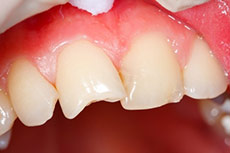Common Causes for Chipped Teeth
September 26th, 2013
 Last week we listed the solutions for fixing a chipped tooth. Today we'd like to get a little more in depth on some of the harmful foods and activities that can crack, chip, or fracture a tooth.
Last week we listed the solutions for fixing a chipped tooth. Today we'd like to get a little more in depth on some of the harmful foods and activities that can crack, chip, or fracture a tooth.
When the enamel of your tooth is worn down, or if your tooth is already fairly decayed, your teeth have much higher potential of chipping. To guarantee you are the least likely to chip a tooth, we recommend, first, to practice proper dental hygiene by brushing your teeth after meals, flossing once a day, and visiting the dentist for cleanings and check-ups on a regular basis.
However, even with proper care for your teeth, a chipped or cracked tooth is still possible. Here are some of the main causes for chipped teeth.
1. Dangerous Foods
While your teeth can often bite down on some tough meals, they're not an invincible force. Often, if you bite down too hard on the wrong food, you'll have to say goodbye to a piece of your tooth. Here are three of the biggest culprits:
Popcorn: Make sure to leave the last few kernels in that bowl of popcorn alone.
Hard Candies: We all find ourselves biting down on a hard candy much earlier than we hoped. Break the mistake by avoiding these dangerous treats.
Ice: Chewing on ice is bad news for teeth. Try switching to sugar-free gum, or better yet, carrots and celery.
2. Dangerous Habits
Nervous ticks and bad habits such as biting your nails or chewing on the back of your pencil can often harm the front of your teeth. Kick those nasty habits before its too late.
3. Grinding In Your Sleep
Many of our patients are doing everything to keep great oral hygiene yet see their tooth enamel wearing down. That is because, whether they know it or not, they are grinding their teeth in their sleep. Some do it when they have a lot of stress in their lives or during a scary dream; others do it for no reason at all. No matter why, it's a leading cause for tooth enamel wear down and potential cracked teeth.
If you suspect you grind your teeth at night, or a significant other has claimed you do, see a specialist that can fit you for a mouth guard that can help stop the problem before its too late.
4. Absent Mouth guard
Speaking of mouth guards, many sports players chip teeth when they don't wear their protective mouth gear. A mouth guard is a safe and easy way to keep your teeth intact. For any sport with physical contact, one should consider using a mouth guard.
5. Using Your Teeth Incorrectly
Ever try to open a bottle or a stubborn potato chip bag with your teeth? Unfortunately this is a very easy way to hurt yourself and crack a tooth. Using your teeth for unintended uses is highly discouraged. Rather, grab scissors, pliers, a knife, or the many other tools man has created to open those frustrating packages.
6. Crooked Teeth
Last, untreated, crooked teeth can cause harm to your teeth by kicking or damaging areas while chewing or other activities. We recommend braces or Invisalign to straighten teeth and ensure that a crooked tooth doesn't cause further damage to your teeth.
We can't encourage you enough to practice proper oral hygiene to save your teeth from becoming chipped, cracked, or fractured among other serious issues. While there's no one to completely guarantee the prevention of dental accidents, the healthier your teeth are, the stronger they are, and subsequently the better they are at fighting against damage.
If you recently chipped a tooth, refer to our post last week on how to repair everything from a small chip to a serious fracture. If you have any more questions, call Water Tower Dental, we're happy to help.

 Whether you took a bite into something too hard for your tooth, or took a nasty spill, the potential to crack, fracture or chip your tooth is possible. Thankfully, there are several ways to fix a chipped tooth depending on the severity of the accident.
Whether you took a bite into something too hard for your tooth, or took a nasty spill, the potential to crack, fracture or chip your tooth is possible. Thankfully, there are several ways to fix a chipped tooth depending on the severity of the accident. What Is Sedation Dentistry?
What Is Sedation Dentistry? A large percentage of Americans suffer from bad breath. While good oral hygiene can help keep bad breath at bay, sometimes a mouth needs to take further measures to help keep it from smelling too bad. Today we'd like to discuss a few natural ways to help reduce bad smelling breath.
A large percentage of Americans suffer from bad breath. While good oral hygiene can help keep bad breath at bay, sometimes a mouth needs to take further measures to help keep it from smelling too bad. Today we'd like to discuss a few natural ways to help reduce bad smelling breath.




 Website Powered by Sesame 24-7™
Website Powered by Sesame 24-7™